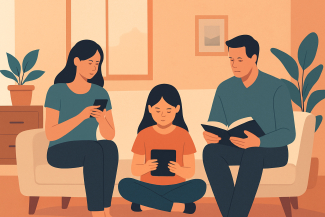
Beyond the Markets: Parenting, Mental Health, and Social Media
Economic data remains mixed. Second quarter GDP growth was revised upward from 3% to 3.3%, following a sharp -5% decline in the first quarter. What drove the rebound? Three factors stand out: fewer imports due to tariffs, stronger consumer spending, and increased business investment possibly linked to AI adoption.
Mixed Signals in the Economy
While tariffs have reduced imports and boosted government revenues, companies are still largely absorbing the added costs. Consumer spending revisions show continued household demand, while AI-related investments are helping fuel business expansion. Whether these trends will hold steady remains uncertain. For context, see our post on navigating market shifts.
Mental Health and “The Loneliness Epidemic”
The rise in mental health concerns predates COVID-19. The pandemic amplified digital dependence, but the spread of smartphones and social media had already shifted social interaction from face-to-face to online. Research is clear: in-person relationships improve mental health. Their decline has contributed to what the Surgeon General has called an epidemic of loneliness.
Smartphones and Kids
Globally, policymakers are debating the role of smartphones in children’s lives. A New York Times report highlighted mixed outcomes from smartphone bans in schools. Meanwhile, Australia is considering a nationwide ban for children under 16. For parents, a critical question is: what will your family’s plan be? One proven strategy is modeling the behavior you expect. Could you commit to a smartphone-free vacation?
Podcasts Worth Exploring
Experts continue to explore the impact of technology on parenting and mental health. A few highlights:
- The Screenagers Podcast — Dr. Delaney Ruston on screen time and kids’ health.
- Ask Lisa: The Psychology of Parenting — Dr. Lisa Damour with evidence-based parenting advice.
- Connected Parenting — Jennifer Kolari on emotional resilience and digital limits.
- The PedsDocTalk Podcast — Dr. Mona Amin with a pediatric perspective.
- Huberman Lab and Rich Roll — featuring Dr. Jonathan Haidt on social media’s mental health effects.
- She Persisted and KevinMD — teen voices and medical insights on digital wellness.
When choosing resources, look for experts with clinical or academic credentials to ensure guidance is grounded in research, not just opinion.
This website is informational only and does not constitute investment advice or a solicitation. Investments and investment strategies recommended in this blog may not be suitable for all investors. SAS Financial Advisors, LLC and its members may hold positions in the securities mentioned within this newsletter. SAS Financial Advisors, LLC is not responsible for any third-party content referenced.
The SAS Newsletters are posted on the SAS Blog weekly: https://www.sasadvisors.com/blog

